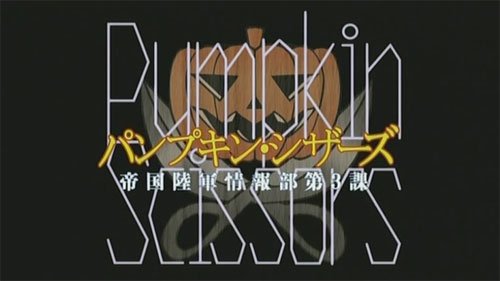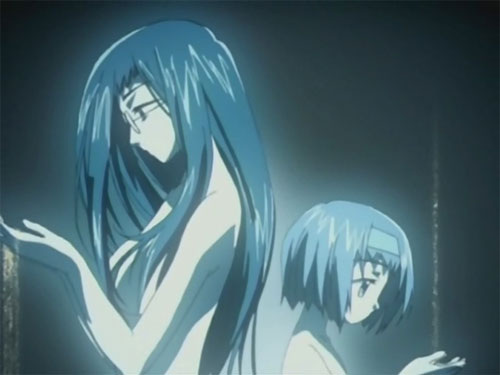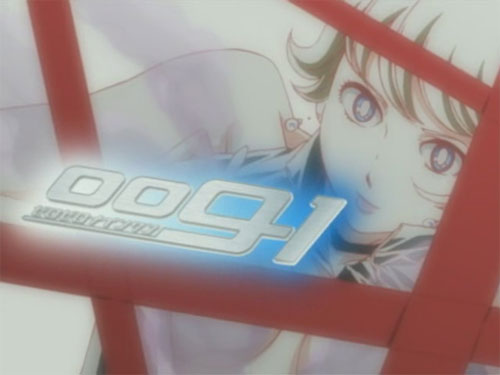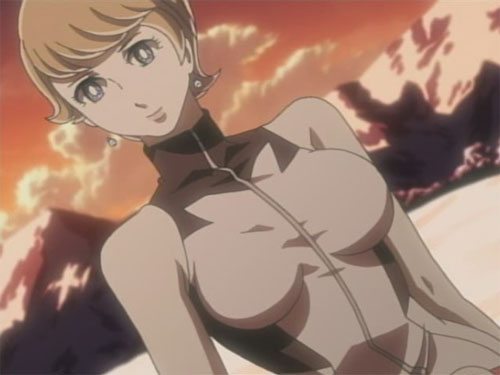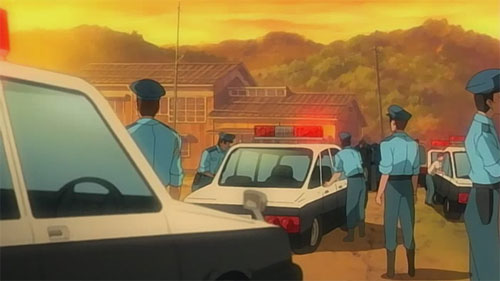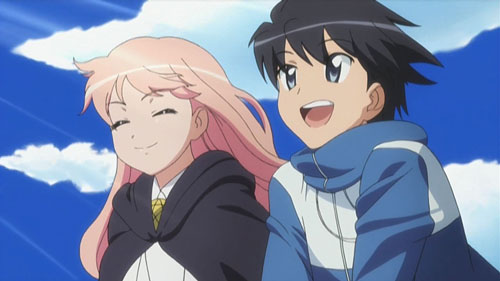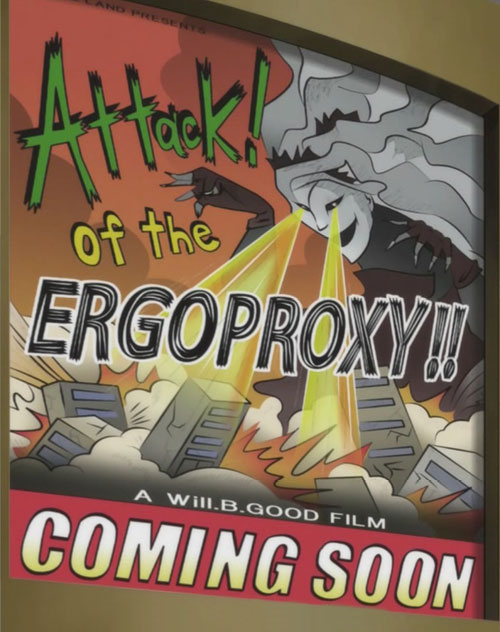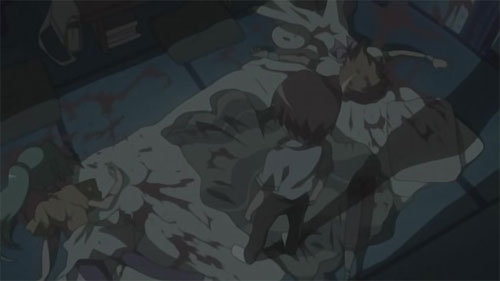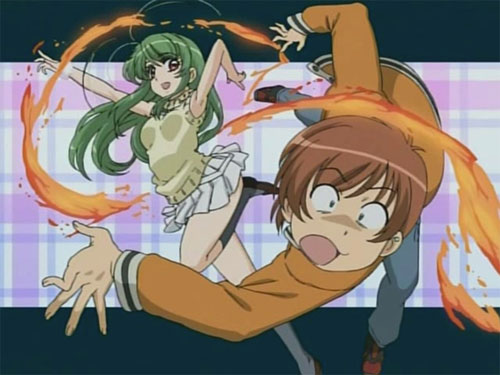Happy Halloween. Everybody I work with and hang out with, and most of the people I work with, have already been given the imperative “Pumpkin Scissors.” Some have understood. Others haven’t, but have gone to where I keep fansubs and taken a look anyway. Others, I’m sure, think I was referencing some inside joke they didn’t get. That’s ok.
Continue reading
Category Archives: Cartoons
Asatte no Houkou
In the time-honored tradition of Freaky Friday and Big, Asatte no Houkou is a tale of people suddenly changing ages. Unlike these precursors, Asatte no Houkou takes itself seriously, which can be both a good and a bad thing. As a basic premise, there’s a lot that can be done with giving a child a grown-up body, or putting an adult in a child’s body. The obvious stuff has already been done to death.
009-1 begins
This week saw the premiere of both anime series I was looking forward to this fall, Pumpkin Scissors and 009-1. The first episode of Pumpkin Scissors was fansubbed within 48 hours of airing, so I’ll skip making a first-episode commentary on it. 009-1, on the other hand. Wow.
This show has a lot going on miniskirt-wearing super-spies, elderly scientists in distress, smirky cold-war villains, a super-spy lunar base, big red buttons that must not be pushed, uniformed goons getting their butts kicked, laser guns, explosions, bigger explosions, and even somebody with machine guns hidden in her boobs.
This all may be a bit much for some folks to handle. These aren’t the clichés that many younger views are accustomed to. These are the stylistic themes of the cold war era, and appropriately-so. The East Bloc versus West Bloc cloak and dagger premise here is ladled on with a bit of a heavy hand, and the art hearkens directly back to the anime being produced back in the 1960’s. Indeed, the character designs and concepts here are the product of the great Shotaro Ishinomori, creator of Cyborg 009 and Kamen Rider. If you liked Giant Robo’s character designs, used to watch Speed Racer, Tranzor-Z, Starblazers, and the like, 009-1 may be right up your alley.
One episode is hardly enough to judge a series, but I certainly intend to keep watching this, and look forward to seeing an English-subtitled version of this (as my Japanese is terrible, worse than terrible, terrible-plus).
End of Higurashi no Naku Koro ni
After twenty-six episodes and six plot-arcs, Higurashi no Naku Koro ni has wound down its anime run, but what do we leave it with? In an industry chock-full of sub-genres, such as macho fighting anime, harem romantic comedy anime, brooding emo anime, silly slapstick comedy, giant robots, war stories, and so forth, this title fit into to no category neatly.
This final plot arc, the Tsumihoroboshi-hen or Atonement Chapter, reveals a great deal, but leaves a lot of rather fundamental questions unanswered. This was anything but a clean break, with all the loose ends neatly tied off for us. Unlike the Eye Opening Chapter that immediately preceded it, this “answer arc” does not re-tell a prior plot arc, but turns it on its head.
Continue reading
Looking back at Zero
Eternal Smile
It has been a little while since I’ve posted about an episode of Ergo Proxy, but this one deserves a little special attention. On one level, it continues the chain of “Vincent and Lil wander into the reach of some random Proxy, conflict ensues, Vincent triumphs” episodes, but the tone really stands out. I was about to write a comment on a review at Star Crossed, but it started growing out of hand, so I’ve opted to put one here instead.
Continue reading
Likely Fall Titles
Every season or so, we watchers of anime (they’re just Japanese cartoons; get over it) are exposed to a new glut of titles. Many are derivatives of past manga (they’re just Japanese comic books; get over it) or visual books / eroge / dating sims. Alas, I haven’t been very good at keeping up with the broad variety of manga available, and just can’t bring myself to play video games whose interfaces tend to revolve around staring at a slide show, clicking my mouse to get the next snippet of dialog. The summer is winding down, with shows like Higurashi no Naku Koro ni winding down and Zero no Tsukaima hitting the midway point, so it is just about time for a new crop to rise up and take their places.
Other, more focused sites like BasuGasuBakuhatsu and Makenai desuwayo have gone to the effort of researching and giving preview opinions of the literally dozens of shows set to air soon, but for some reason I just can’t do it. My reasons for dismissing some of these titles are so petty, so trivial as to be almost embarrassing. Additionally, I’ve been so very wrong about titles in the past (G-On Riders looked so promising for a couple episodes, really it did!) that such predictions based on a handful of promotional drawings are just bound to fall on their face and reveal me as the untalented hack that I may well be.
That said, a couple of titles will definitely get a viewing from me, for at least a couple of episodes.
Continue reading
Oyashiro Grand Unification Theory
Blatant spoilers follow:
Higurashi no Naku Koro ni is the kind of series that invokes a great deal of theorizing, speculation, and at least a little confusion. Four “question” arcs have been aired and translated to English, and the first “answer” arc just wrapped up, shedding a great deal of light on one of the scenarios, and possibly others. Much like in the realm of theoretical physics, I am currently seeking a plausible grand unification theory for this show. What would be necessary for these plot arcs to all have a basis in the same set of facts?
Continue reading
Dog-related folklore gone wrong
An inugami is a dog spirit that avenges or serves its master, sometimes taking human form or possessing the living. Inukami, on the other hand, is a silly show about cute female dog spirits that fight obliterating evil and proliferating righteousness. Oh, boy.
Continue reading
Zero's Familiar
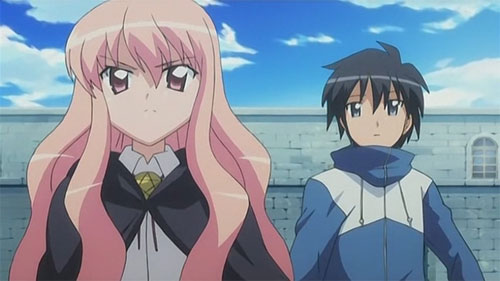
Zero no Tsukaima (Zero’s Familiar) is another one of those series that, along with Higurashi no Naku Koro ni (When the Cicadas Cry), sounds a lot less dopey when you use Japanese. This series, along with Inukami, holds a position of the guilty pleasure.
Continue reading
